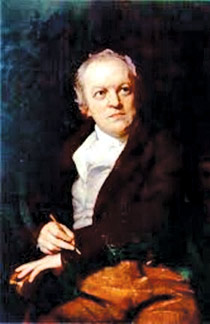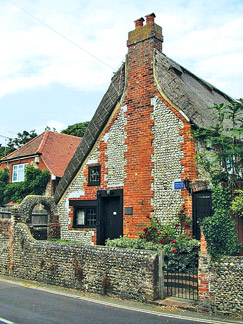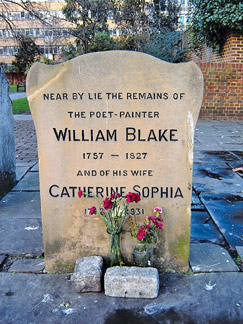|
William Blake:
A mystical and visionary poet
by W.T.J.S. Kaviratne – Ambalangoda Spl. Cor.
 William Blake was a 19th century poet, painter, artist and engraver
born in Soho district London, England. His father James Blake and mother
Catherine Wright Armitage were highly conscious of the temperament and
visionary utterances of their son young William Blake and on certain
occasions they even punished him for talking about his visionary
experiences as lying. William Blake was a 19th century poet, painter, artist and engraver
born in Soho district London, England. His father James Blake and mother
Catherine Wright Armitage were highly conscious of the temperament and
visionary utterances of their son young William Blake and on certain
occasions they even punished him for talking about his visionary
experiences as lying.
In 1782 Blake got married to Catherine Boucher who could neither read
nor write but later he taught her reading and writing and even the art
of engraving and painting.
At the age of four Blake had claimed that he had seen God put his
head to the window and again when was nine he had seen a tree filled
with angels when he was walking through the countryside.
Blake was highly frustrated over the death of his brother Robert
Blake and later Blake was known to have said that he had seen how the
spirit of Robert was released.
‘His spirit ascended heavenward through the matter of fact ceiling
clapping hands of joy.’
Visions
Over the years similar experiences of visions and dreams of
supernatural beings increased throughout his whole life time and he made
similar expressions based on his imaginations even during the final
hours of his life.

Blake had cried to his wife a few hours before his death‘ Stay Katel
keep just as you are. I will draw your portrait for you have ever been
an angel to me‘.
Having completed the portrait of hers he passed away peacefully.
Blake is also identified as a radical both in his thinking and in
composing poems and in visual arts of paintings and engravings.
Besides he combined his literary and pictorial genius in exploring
contemporary issues relevant to politics, religion and psychology as his
themes in his poems.
French and American Revolutions also had a great influence on him.
The visions and hallucinations experienced by Blake since his early
childhood triggered his imaginations in creating poems using simple
diction but having very abstruse philosophy and mysticism which his
contemporaries found difficult to fathom and tagged him as mentally
deranged.
Spiritual world
According to his visionary thinking Blake believed that there were
two worlds he had identified as natural world and spiritual world both
existed independently.

‘Everything in the spiritual world is spiritual while everything in
the natural world is natural.’
Blake’s imagination was based on the inner world of his vision and
those imaginations were higher when compared to the physical reality or
the world of matter.
He was not a believer of visual world and always relied on his own
inner vision.
His mind was always visual and visionary and he thought reason could
destroy them.
On the analysis of the themes of his poems and of his numerous
engravings and paintings it is evident that Blake had an inner vision
beyond sense perception and he was in constant touch with what he
perceived through the eye of the soul. Blake emphasised this in his own
words:
‘A spirit and a vision are not as the modern poses, a cloudy vapour
or nothing.
They are organised and minutely articulated beyond all that the
mortal and perishing nature can produce.’
‘With my inward eyes ‘tis an old man grey.
With my outward, a thistle across my way.’
Inner emotion
Blake could visualise an inner emotion very quickly as he lived in
the spirit which was source of his imagination.
Blake’s philosophy was based on the exaltation of the sprit over the
body, instinct and intuition over education and of spiritual vision over
the impressions of the physical sense.
He made a famous statement that it was possible to see the infinite
and the external beyond the material appearances of the finite world.
‘If the doors of perception were cleansed, everything would appear as it
is infinite.’ As a mystic and visionary poet Blake rejected all beliefs,
philosophies and attitudes that existed in the 18th century England.
Songs of innocence and experience
Blake composed ‘Poetical Sketches ’(1783),‘Songs of Innocence’,
(1789) and ‘Songs of Experience’ (1794). The Songs of Innocence
comprised 19 poems including‘ the Lamb, the Shepherd, the Little Boy
Lost, the Little Boy Found, the Blossom, the Chimney Sweeper, Night,
Spring and a Dream are some of the Songs of Innocence.
There are 26 poems including Earth’s Answer, The Little Girl Lost,
The Little Girl Found, The Sick Rose, The Fly, The Tiger, Ah! Sun
Flower, The Lily, The Garden of Love and London are some of the Songs of
Experience.
Metres of ballads, nursery rhymes and hymns had been employed by
Blake in his poems.
Literary critics says that the ‘The Songs of Innocence’ and the ‘ The
Songs of Experience’ are primarily based on Milton’s Existential Mythic
States of Paradise and Fall.
Poetic genius
Using his poetic and artistic genius Blake very strongly condemned
the Church of England, which he believed in spreading institutionalised
religion , state and the ruling classes of the era and the Industrial
Revolution instrumental for spreading poverty, corruption and
exploitation in the society.
In the Songs of Experience Blake exposed the loss of childhood
vitality due to fear of inhibition created by social and political
corruption and repressed the innocence of childhood.
Some scholars attribute religious views of Blake to his exposure to
Gnosticism and Cabbalism and the influence of thinkers such as Emmanuel
Swedenborg and Jacob Boehme. In ‘Chimney Sweeper’ the child is unaware
of his exploitation which is inexperience and he accepts his fate
happily as he is aware that he will go to heaven.
“When my mother died I was very young, And my father sold me while
yet my tongue Could scarcely cry ‘Weep’, ‘Weep’, ‘Weep’,
So your chimney I sweep and in soot I sleep.’
‘Marriage of Heaven and Hell’ along with 25 engraved plates had been
produced by Blake In 1797 which was a satirical portrayal of the
penetrating the essential nature of human experience.
Creative energy
Dual world of opposites and how the rules of reason and religion
repress and pervert the basic creative energy of humanity have been
identified as some themes of the poem.
Blake believed ‘good and evil’, ‘angels and devils’, ‘love and hate’
were needed for human survival.
‘The Tiger’ is a Song of Experience portraying the God’s power of
creation.
Blake had used expressions such as ‘fearful symmetry,’ burning
bright, fire, hammer, chain furnace and anvil as images.
The suffering of innocence and Jesus Christ are portrayed in ‘Lamb
and comprised a repetition of questions found easy to answer than the
questions raised in the Tiger.
As usual almost all the poems composed by William Blake have been
analysed in so many ways by literary critics.
Interpretations
Popular poems of ‘The Lamb’ (Songs of Innocence) and the ‘The Tiger’
(Songs of Experience) composed by Blake usually discussed through
comparison and contrast of similarities and interpretations have been
given by literary critics.
Half of the poem‘ The Tiger’ comprises twelve questions directly
addressed to the Tiger proved unanswerable. |

